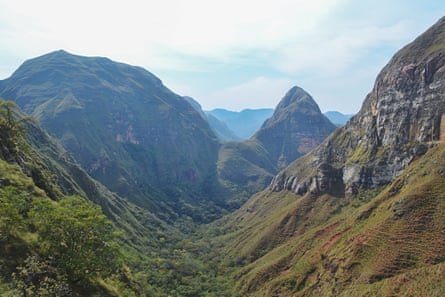
It was 2007 and I was weeks into a solo backpacking trip in South America. By the time I reached Bolivia, my Spanish had improved markedly and so had my resolve not to continue being swindled by local taxi drivers and their ilk who dared exploit my first-worldliness.
So when, late one afternoon, I boarded a bus in the town of Samaipata for the 15-hour journey to Sucre, I had done my research and knew the fare was maximum 70 bolivianos (approximately US$10).
The coach was full so I stood up the front with the driver’s assistant, who assured me a seat would become available within half an hour. Sure enough, a passenger soon disembarked and as we took off again, hurtling up the precipitous mountain road, the driver’s assistant asked me for the fare: 100 bolivianos. But the normal price, I protested, was no more than 70 bolivianos. He avoided eye contact, saying if I didn’t want to pay 100, I could get off. After a few back-and-forths – me offering to pay 70 bolivianos, the driver’s assistant offering to show me the door – the bus screeched to a halt in the middle of nowhere. There was forest to the left of us, a drop to the right and the sun taking its last gasp behind the looming ranges.
The driver’s assistant opened the luggage hold and yanked my monster backpack on to the side of the road. I followed him, still convinced my Spanish skills could help me save US$4. He stepped back on the bus and as the doors began to shut, he finally turned to look me in the eyes. I racked my brain for the best comeback line seven weeks of Spanish lessons could produce, settling on what only someone well-schooled in both Jewish guilt and conditional verb conjugations could muster. “Would you leave your sister here?” I asked.
Confusion flashed across his face, but as the bus sped off, I was euphoric. Not only had I fashioned a complex sentence in Spanish, I hit a nerve with my pointed words.
Or had I?
As I trudged up that darkening road, I realised I had made the rookie error of mixing up the two verbs for “to leave” (salir and dejar). What I had actually said to my antagonist was something closer to: “Do you date your sister?” A cutting insult, perhaps, if we were 12 years old.
I walked on, with creeping dread, for what felt like 40 days and 40 nights (but in reality was probably 40 minutes) until I saw lights in the distance – a roadside gas station with an adjacent diner. Parked out front were a fleet of overnight coaches, en route to Sucre. Passengers were returning from their dinner breaks and the buses were leaving. I leaped on to the last remaining bus and asked the driver for a seat. “It’s full,” he said. I craned my neck down the aisle and told him I could see two empty seats towards the back. “OK,” the driver shrugged. “That’ll be 70 bolivianos.” Gleeful, I gave him the cash and practically skipped down the aisle to luxuriate in my two seats for the price of one.
The bus took off and I had just enough time to kick off my sneakers, snuggle into the seat and succumb to a wave of exhaustion before I was disturbed by the other passengers thumping on the bus’s windows. Some were yelling and at least one was hammering on the Virgin Mary-decorated door to the driver’s compartment. Out the window I saw a car driving erratically alongside the bus; two people were in the back seat – one was hanging out a window, bellowing and waving her arms. It transpired that the couple had been finishing their dinner when the coach took off without them – their bags still in the luggage compartment. A man at the gas station had offered to help chase down the bus with his car.
The bus pulled over and the couple boarded, breathless and smiling. There may have been applause from the other passengers; I don’t recall. I was too focused on the fact the couple were walking towards me. I was in their seats. Could I vacate. Chastised, I gathered my belongings and plonked myself in the aisle on the floor of the bus, not far from the feet of the Virgin Mary. The road became more serpentine and I clutched the base of seats to prevent sliding or being catapulted.
A couple of uncomfortable hours later, another seatless passenger boarded – a woman in a voluminous skirt who said she often travelled this route. She sat on the floor behind me and showed me how, if we leaned our backs and heads against each other like human chairs, we could get some sleep. Before long she was snoring powerfully in my ear. Every time I managed to drift off, my head would roll off hers, jerk back in a whiplash motion and then slam into an armrest.
Outside, rain was now pummelling down and lightning was illuminating the narrow mountain road. The bus came to a standstill. The deluge had caused a landslip and the road was impassable. The driver got out and did not return for many hours. Methodically, doggedly, he removed rocks and soil with his bare hands.
That 15-hour journey to Sucre took almost 22. I was wobbly and dizzy as I disembarked in that whitewashed world heritage-listed city. I turned and thanked the driver; he stared back with blank and bloodshot eyes, the floor beside him strewn with chewed-up coca leaves.
When I finally found accommodation, I unfurled my twisted spine on the bed and wondered if the world would ever stop spinning, my skull would ever stop pounding and if I’d ever truly master Spanish verbs.



